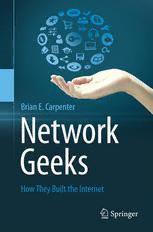Table Of ContentNetwork Geeks
Brian E. Carpenter
NETWORK GEEKS
How they Built the Internet
An Imprint of Springer Science + Business Media
Brian E. Carpenter
Auckland, New Zealand
ISBN 978-1-4471-5024-4 ISBN 978-1-4471-5025-1 (eBook)
DOI 10.1007/978-1-4471-5025-1
Springer London Heidelberg New York Dordrecht
Library of Congress Control Number: 2013932231
© Springer-Verlag London 2013
Published in the United States by Copernicus Books,
an imprint of Springer Science+Business Media.
Copernicus Books
Springer Science+Business Media
233 Spring Street
New York, NY 10013
www.springer.com
This work is subject to copyright. All rights are reserved by the Publisher, whether the whole or part of
the material is concerned, specifi cally the rights of translation, reprinting, reuse of illustrations, recitation,
broadcasting, reproduction on microfi lms or in any other physical way, and transmission or information
storage and retrieval, electronic adaptation, computer software, or by similar or dissimilar methodology
now known or hereafter developed. Exempted from this legal reservation are brief excerpts in connection
with reviews or scholarly analysis or material supplied specifi cally for the purpose of being entered and
executed on a computer system, for exclusive use by the purchaser of the work. Duplication of this
publication or parts thereof is permitted only under the provisions of the Copyright Law of the Publisher’s
location, in its current version, and permission for use must always be obtained from Springer.
Permissions for use may be obtained through RightsLink at the Copyright Clearance Center. Violations
are liable to prosecution under the respective Copyright Law.
The use of general descriptive names, registered names, trademarks, service marks, etc. in this publication
does not imply, even in the absence of a specifi c statement, that such names are exempt from the relevant
protective laws and regulations and therefore free for general use.
While the advice and information in this book are believed to be true and accurate at the date of
publication, neither the authors nor the editors nor the publisher can accept any legal responsibility for
any errors or omissions that may be made. The publisher makes no warranty, express or implied, with
respect to the material contained herein.
Printed on acid-free paper
Springer is part of Springer Science+Business Media (www.springer.com)
To Margaret, who put up with it all.
Preface
I was extraordinarily lucky to be born when and where I was. Of all the times and
places to arrive, 1946 in Britain was perfectly placed to benefi t from the affl uent
society, universal health care and the best years of the British education system.
English turned out to be a good choice as a native language, and I was well advised
to pick computing as a career path in 1966 and to specialise in computer networking
from 1985. I was also very fortunate to have the opportunity to work at CERN, then
without a doubt the most successful example of large-scale international intellectual
and technical collaboration on the planet. I was again fortunate to take part in the
growth of the Internet in Europe, to discover the Internet Engineering Task Force
(IETF) in 1992 and to be made so welcome there. Finally, I was fortunate to spend
many years rubbing shoulders with some of the engineers who have ridden the
Internet roller coaster since then.
This book is an attempt to tell you what this professional experience was like
and what some of the people were like and to explain enough of the science and
technology to make the Internet seem less of a magic trick. At the same time, it
covers the history of the Internet as I saw it being built. It isn’t a work of scholarship
and is certainly far from a complete history. In a few places, there are technical
details, but they can be skipped.
Over the last two centuries, there has been a fascinating interaction between
events on the world stage, developments in science and technology that led up to
the Internet and their impact on ordinary families. I have taken the liberty of using
aspects of my own life to illustrate this and to show how somebody of my generation
could become a technologist.
Auckland , New Zealand Brian E. Carpenter
vii
Contents
1 Hey Folks! ................................................................................................ 1
2 Before My Time ....................................................................................... 9
3 Where Do Geeks Come From? .............................................................. 27
4 Going Up .................................................................................................. 39
5 In Control. ................................................................................................ 53
6 Two Ivory Towers .................................................................................... 63
7 Diversity ................................................................................................... 79
8 Economy Class ........................................................................................ 97
9 Parallel Universes .................................................................................... 111
10 The Years of Miraculous Growth .......................................................... 127
11 Going Under ............................................................................................ 141
Acknowledgements ......................................................................................... 151
Further Reading .............................................................................................. 153
Index ................................................................................................................. 157
ix

